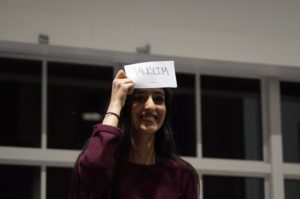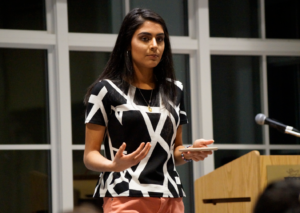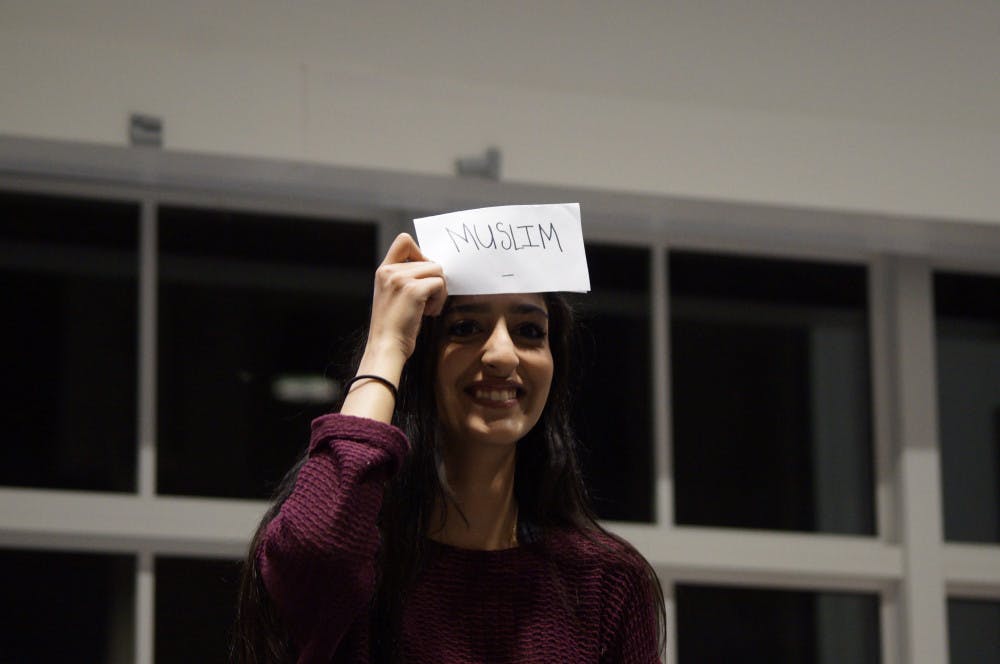By Hannah Fakhrzadeh
Staff Writer
“We close our eyes so we don’t have to see the children’s blood-soaked school uniforms, their still sizzling flesh or their bodies contorted in terrible positions.”
For junior biology major Sameera Chaudhry, the horrible scenes displayed in the media of war-torn Syria and the innocent faces of lives that were lost are forever etched in her mind.
Chaudhry discussed the daily injustices that occur around the world, yet most people choose to turn a blind eye.
Students gathered on Thursday, April 6, in the Education Building to hear the Muslim Students’ Association’s Justice Monologues, where students discussed issues of injustice, both in their lives and around the world.

In her monologue, Nawal Mubin, a sophomore communication studies major, pointed out that our nation has witnessed various movements supporting minorities that don’t feel equally represented.
“We say everyone is equal, but we still have (so many) movements for minorities,” she said.
Mubin also brought up the lack of justice in cases like the shooting of Trayvon Martin.
“How can we sit back when we know innocent lives are taken every day?” she asked the audience.
Kyle Kulaga, a freshman career and community studies major, shared a touching story about struggling with his hearing disability in school because some of his teachers did not use American Sign Language in their classes.
“Do you think it’s fair for someone with hearing loss to go through what I went through?” he asked. “I don’t think so, and I want people to know that American Sign Language was a big part of my life.”
Iman Khan, a sophomore biology major, shared an empowering story of overcoming differences in her monologue entitled, “A Triumph of the Conscience.”
“Why am I different? What makes me different?” Khan remembers asking in regard to her darker hair and skin.
Eventually, Khan realized that she should be proud of her identity and not let the opinions of others affect how she sees herself.

“I am me and me is what they will see,” she said.
Matthew Hardy, a senior sociology and women’s, gender and sexuality studies double major, explained an enlightening encounter he had with a Muslim man who gave him a Holy Quran.
“We are all humans,” he said. “I encourage everyone to really listen because you never know what you will learn.”
The Justice Monologues not only provided students the opportunity to tell their stories, but inspire those in attendance, as well. Engy Shaaban, a junior special education and psychology double major, developed a new perspective following the event.
“I think in this day and age, ignorance and especially close-mindedness can be so incredibly dangerous,” she said. “For me, coming to these sorts of events is a way to be exposed to different perspectives that I might not typically have access to.”
The feeling was mutual for Zainab Rizvi, a member of MSA and a junior elementary education and women’s, gender and sexuality studies double major.
“Many people live in their own bubble, and it’s important that they come out and hear the experiences of others,” she said. “It’s a way to appreciate the lives of others and understand that people come from all backgrounds.”
Zahra Memon, MSA’s public relations chair and a sophomore deaf education and iSTEM double major, shared her thoughts on the event.
“We’ve all faced some type of injustice in our lives, and even if we haven’t, someone who shares our ethnicity or culture has been affected in some way,” she said. “The Justice Monologues are a way for all of us to come together and hear the stories of students who have felt injustice.”
Memon believes it is important for students to empathize with their peers.
“We often forget to put ourselves in the other person’s shoes, however, this event will give us the chance to see the other end of the lens,” she said.







